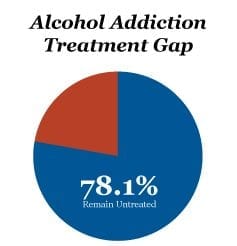Are online treatment programs effective? The answer is – it depends.
For some people struggling with an addiction, they recognize that they have a problem and seek help. But for others, there are barriers preventing them from reaching out. Barriers such as lack of motivation and stigmatization are common issues that prevent substance users from seeking treatment. Living in a remote geographic location and not having adequate treatment resources in their area, and no means to pursue treatment elsewhere, are also barriers for seeking treatment.
 The reality is that due to various barriers most people struggling with an addiction go through it alone and do not seek any form of treatment. In this case, online treatment can be a safe and private alternative for those who are not ready or are unable to join a formal addiction rehab program. Online services can be helpful in diminishing the treatment gap, which is the gap between people in need of treatment and those actually receiving it. It is estimated 78.1% of people suffering from alcohol abuse and dependence remain untreated (Blankers et al., 2011).
The reality is that due to various barriers most people struggling with an addiction go through it alone and do not seek any form of treatment. In this case, online treatment can be a safe and private alternative for those who are not ready or are unable to join a formal addiction rehab program. Online services can be helpful in diminishing the treatment gap, which is the gap between people in need of treatment and those actually receiving it. It is estimated 78.1% of people suffering from alcohol abuse and dependence remain untreated (Blankers et al., 2011).
When looking at online treatment, there is a very wide spectrum of internet-based addiction services. Most of which fall into 3 categories:
- Self-assessment and feedback tools
- Online self-help therapy tools
- Individual therapy
1. Self-assessment and feedback tools
The Internet can be a great way for people to gain insight into how their drinking behaviour is impacting their lives. There are many websites, which contain personalized self-assessment tools that provide immediate feedback. For instance, someone completing an online questionnaire can find out how their consumption of alcohol compares to the rest of the population. This can be a great tool helping people recognize that they have a problem and may need help.
2. Online self-help therapy tools
Another useful online service is internet-based self-help tools. These usually include fully automated treatment modules that are based on cognitive behavioural therapy (CBT) or motivational interviewing principles. These modules include consumption diaries, examination of pros and cons of drinking, exploring strategies for dealing with cravings, etc. However, one downfall of such programs is that they are not tailored to a person’s individual needs and usually have low adherence rates (Blankers et al., 2001).
3. Individual therapy
Individual internet-based therapy is a great way to receive personalized feedback from a professional online. Such therapy can be obtained in real-time or it can be email/chat-based. An advantage of this form of treatment is that it is convenient and can be done from home. It is also anonymous, which can be a bonus for some individuals who are not yet ready to see a counsellor face to face. On the other hand, studies investigating the effectiveness of online treatment have yielded mixed results and this area of treatment is in need of further study (Blankers et al., 2011).
Other disadvantages/concerns of online treatment
It is important to consider that when a person is receiving therapy online or even over the phone, some key verbal and visual cues can be lost. This makes it harder for the therapist to notice subtle emotional changes in their client and vice versa.
Another issue that has been found to affect the online treatment community in one study is the issue of therapist credentials. It is difficult to know whether online treatment providers are members of professional associations and adhere to ethical guidelines and best practices endorsed by reputable regulatory bodies. For example, only 32% of practitioners asked their clients to sign an informed consent form, and 42% did not use an encryption method to protect their client’s confidentiality (Blankers et al., 2011). When receiving online treatment it is important to verify counsellor credentials and ensure that they are following ethical guidelines.
Questions to ask when selecting online treatment
Here are some questions you should ask when arranging to work with a counsellor online:
- What are their credentials?
- How will they protect your identity?
- What encryption methods are being used to protect the security of communications?
- Will they help you get in touch with local crisis support in case of emergency?
- Are they aware of any potential risks and benefits of not receiving the same services in person?
Overall, online treatment for substance use can be a great tool for someone looking to protect his or her confidentiality and receive easy access to counselling. They can also be an excellent addition to formal treatment. However, it is important to be mindful of the fact that online treatment is not for everyone. Individuals with more serious alcohol or drug dependence should receive formal support. This is especially the case for those who require medical supervision, detoxification or monitoring (Strofle, 2004). Online treatment may also not be suitable for people who have concurrent mental health concerns in addition to substance use.


